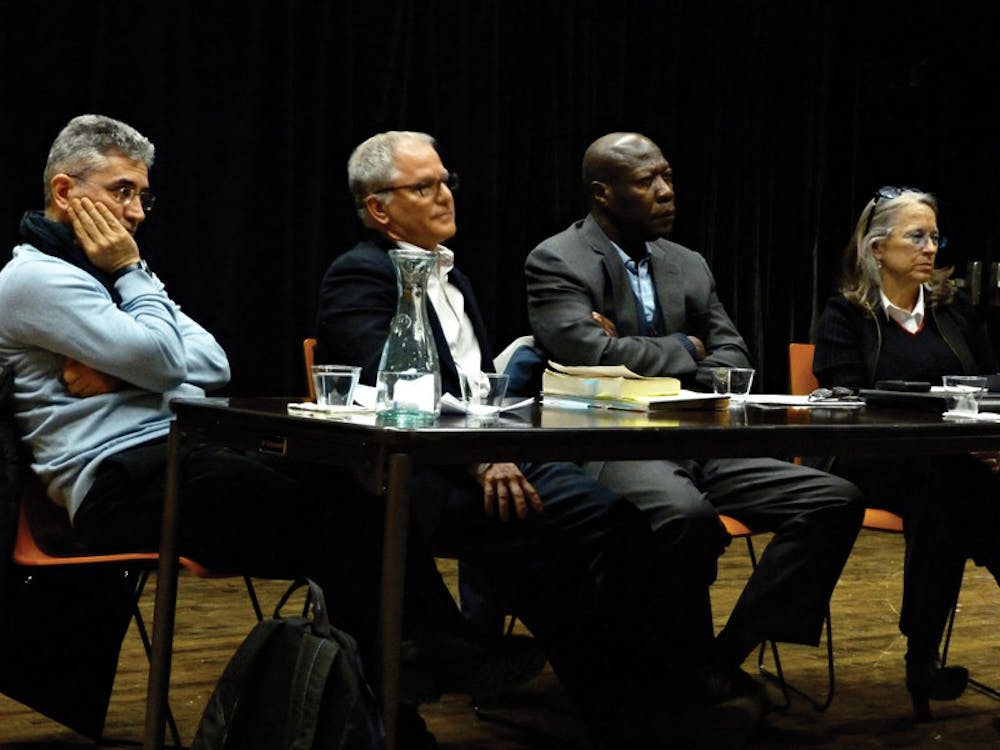A story is a mechanism for sharing a memory, relating the outcome of an event, expressing an opinion — but not all political systems allow their citizens to tell stories without fear.
At the “Urgent Witness: A Freedom-to-Write” conference co-sponsored by the Department of Literary Arts and the International Writers Project Monday evening, George Seremba and Gazmend Kapllani — both at one point persecuted for expressing their ideas — shared their stories at the McCormack Family Theater. Seremba is a fellow and Kapllani a visiting scholar of the IWP, a literary arts initiative to support writers who face danger in their homelands because of their work.
Founded in 1989, IWP awards fellowships to writers at risk around the world, said Erik Ehn, head of playwriting and professor of theater arts and performance studies. Started by Robert Coover in response to conflict over protests in Beijing’s Tiananmen Square, IWP has sponsored writers from around the world living under a government that restricted freedom of speech. Both Kapllani and Seremba also experienced “civilly sanctioned acts of silence,” Ehn said. “They survived to speak.”
The literary presentations Monday night followed a panel discussion earlier in the day that featured Seremba, Kapllani, Vice President of PEN International Joanne Leedom-Ackerman and Larry Siems, director of Freedom-to-Write and international programs at PEN American Center.
This year, IWP is hosting Seremba as he works on a memoir adaptation of his play, “Come Good Rain.” Seremba, an Ugandan exile, explained that his first experience with storytelling came at a young age. “The homeland is the school, and the fireplace is the classroom,” he said. Primarily a playwright, he uses live performance to articulate his experience escaping the political turmoil of his homeland.
“A storyteller is someone that bears witness,” he said. “You can bring your own narratives to life.”
Seremba projected a clip of a performance of “Come Good Rain,” which he describes as a testimony to his experience of becoming an Ugandan exile. A student at the time of the overthrow of authoritarian ruler Idi Amin, Seremba and his peers at the university he was attending expected the country’s politics to improve. When, three months later, they did not, “we felt a responsibility to cry out against the evils of the day,” Seremba said. “My role as an activist ended up becoming quite lethal for me.”
On the eve of the new political elections of December 1980, Seremba was abducted, interrogated, beaten, tortured and left for dead. “It rained a lot that night, and I was told later on that that rain and the mud in the forest helped clot my blood, and so I was able to miraculously find myself alive the next day.”
After surgery and secretive hospital treatment, Seremba escaped Uganda. Nine years later, in Canada, he wrote “Come Good Rain” about his experience. He said he has never since seen as much suppression of thought as he did in Uganda. “The irony is … that (the censorship) is still in many ways as oppressive as it was when those events were unfolding,” he said.
The role of a writer is the role of a messenger, he said. “The world has become a smaller place. … You can’t help but condemn what is going on, and hopefully you do it as far as you can artistically manage. You have the aesthetics and the ethical.”
Kapllani, an Albanian writer, lived in a climate of political censorship that he described as similar to that of North Korea today. The government banned many books, and finding reading material in Albanian was difficult, he said.
Learning French and Italian allowed him to listen to foreign radio stations, he said. “They were my only windows to reach the world beyond the borders.”
He also obtained fragments of banned books in these languages. “Every book that we had in our hands was like a fortune — a piece of gold,” he said, adding that this illicit reading and eventually translating books triggered his love of writing. As a student, Kapllani was involved in the movement against the regime. His activism and involvement in a violent political rally eventually made him an enemy of the government and prompted his flight from Albania to Greece.
Kapllani said sharing stories is the reason he became a writer. His book “Short Border Handbook” deals with those points — the borders — that all immigrants physically and psychologically come to in their lives. “The writing of it was like untying the knots inside of me,” he said.
But this persecution did not end when he left Albania. “I have forever in my life been a traitor,” he said.
As an author, he said, he sought and still seeks to share his opinion, and the opinions of others without the chance to be heard. “I try to bring together the activist and the writer,” he added. When he was living in Greece, he wrote three novels and advocated for human rights and immigration rights in newspapers. After some time this work against the government’s treatment of immigrants made him once more a target of the police and extremist political factions.
As an extremist political party took a larger share of the Greek parliament, Kapllani came to the United States as a Radcliffe Harvard Fellow, and is now the IWP’s visiting scholar for 2013. It is important to share others’ silenced stories so they do not just get blurred into the past, Kapllani said. “Brown’s help has been invaluable to help me continue to write without any pressure, any fear or any strife,” he said.

ADVERTISEMENT




